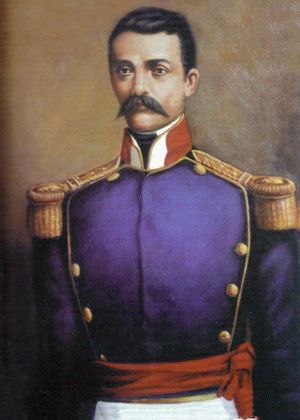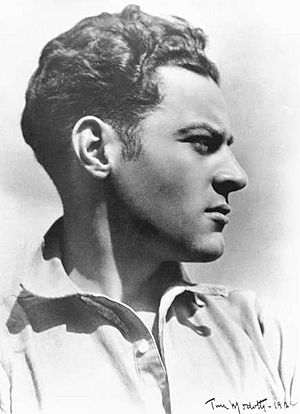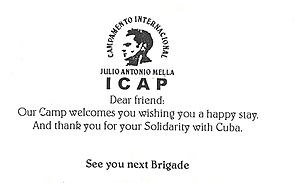Julio Antonio Mella facts for kids
Quick facts for kids
Julio Antonio Mella
|
|
|---|---|
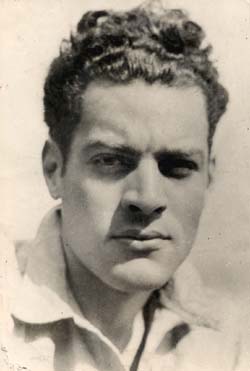
Julio Antonio Mella in 1928
|
|
| Born |
Nicanor McPartland
26 March 1903 |
| Died | 10 January 1929 (aged 25) |
| Occupation | Journalist |
| Political party | Communist Party of Cuba |
| Spouse(s) | Oliva Zaldívar Freyre |
Julio Antonio Mella McPartland (born Nicanor McPartland; 25 March 1903 – 10 January 1929) was an important Cuban political activist and journalist. He was also a communist revolutionary. Mella helped start the first Communist Party of Cuba.
Mella studied law at the University of Havana but was later expelled in 1925. He worked against the government of Gerardo Machado, which was becoming very strict. Mella left Cuba and went to Mexico City. There, he worked with other Cubans who were against the Machado government. He was killed in 1929, and historians still debate who was responsible. Today, the Cuban government sees Mella as a communist hero.
Contents
Mella's Early Life and Education
Julio Antonio Mella was born Nicanor McPartland in 1903 in Havana, Cuba. His father, Nicanor Mella Breá, was a tailor. He was also the son of Matías Ramón Mella Castillo, a hero of the Dominican Republic. Julio's mother, Cecilia McPartland, was the daughter of Irish immigrants.
When he was young, Mella and his brother went to New Orleans with their mother. Later, they returned to Cuba to live with their father's wife, Mercedes Bermúdez Ferreira. She became their stepmother. At this time, Nicanor's name was changed to Antonio.
Mella went to several schools in Cuba. He studied at Chandler College and Colegio Mimó. After his stepmother died, he returned to Cuba from the US. He then prepared for the University of Havana at Academia Newton. He finished his high school studies in 1921.
Becoming a Student Leader and Activist
Mella became a political activist early on. He was first arrested when Alfredo Zayas was president (1921–1924). Mella studied law at the University of Havana. He quickly became a strong student leader.
Students at the university took action to improve their education. They demanded changes like updated textbooks and more freedom for the university. They also wanted education to be free for everyone.
Mella soon joined the fight against Gerardo Machado, who would become the next Cuban president. Students helped create the "internationalist" Partido Comunista de Cuba. Mella was expelled from the university after being arrested. He was accused of plotting against the government. After being released from jail in late 1925, Mella left Cuba in early 1926. He traveled north to Mexico City.
Founding the Cuban Communist Party
Cuba had several communist groups even before Mella's time. The original "internationalized" Communist Party of Cuba was formed in the 1920s. This was when Gerardo Machado was president and later a dictator.
This party was officially recognized by Moscow in 1925. Julio Antonio Mella was one of the main founders of this party. Other important founders included Juan Marinello and Carlos Baliño. One key figure was Fabio Grobart, who was from Poland. He was a member of the Soviet-controlled Comintern. He was often seen as a secret leader for communists in the Caribbean.
Some founders used different names when they wrote or worked. For example, Mella sometimes used names like Cauhtémoc Zapata. The revolutionary known as Blas Roca was born Francisco Calderío. These names often had historical meanings.
The Cuban Communist Party later changed its name to the People's Socialist Party. This was done for election reasons. Its policies were often guided by Moscow. At different times, it supported leaders like Gerardo Machado and Fulgencio Batista.
Life in Mexico
Mella escaped from Machado's harsh rule in Cuba. He traveled through Honduras, Guatemala, and finally reached Mexico City in 1926. In Mexico, he wrote for several newspapers. These included Cuba Libre and El Libertador. He also started a group called the Asociación de Nuevos Emigrados Revolucionarios Cubanos in 1926. This group was for new Cuban revolutionaries living in exile.
Mella's Death
Julio Antonio Mella was working as a Cuban Marxist revolutionary in Mexico. He worked with other Cubans living outside Cuba to plan the overthrow of General Gerardo Machado's government. This goal was difficult for the Cuban Communist Party. They were trying to find a way to work with Machado's government. Some Cuban communists also worried that Mella was influenced by Leon Trotsky, a former Soviet leader.
Mella was killed on 10 January 1929. He was walking home late at night with photographer Tina Modotti when he was shot.
Remembering Julio Antonio Mella
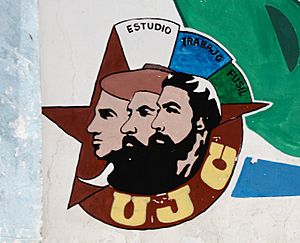
On 29 September 1933, soldiers under Fulgencio Batista stopped a procession to bury Mella's ashes in Havana. There is a small park in Havana that remembers this event.
A statue of Mella once stood near Havana University. It was a place of great respect for Marxists. Before the 1961 Bay of Pigs Invasion, this statue was often knocked down at night. But each time, it was quickly put back up by the next morning.
In Caimito, a small town in Artemisa Province, there is a camp named Campamento Internacional Julio Antonio Mella in his honor. The town of Mella, in Santiago de Cuba Province, was also named after him.
See also
 In Spanish: Julio Antonio Mella para niños
In Spanish: Julio Antonio Mella para niños
 | Audre Lorde |
 | John Berry Meachum |
 | Ferdinand Lee Barnett |


